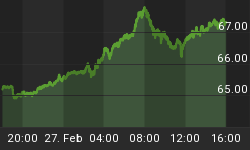There is a very important development regarding the YEN carry trade. I deem this important enough to post a market crash alert.
The Japanese economy is strengthening enough to cause an unwinding of the massive YEN carry trade. The last time this happened, there was the LTCM collapse.
Japan has had enough economic growth these last quarters, in production growth and consumer spending, that the BOJ may well end the policy of zero interest rates in Japan.
That zero rate interest policy has lasted about ten years, and is the first source of the liquidity bubbles world wide, and is very much a part of the liquidity bubbles here in the US. Once the BOJ starts to raise interest rates in Japan, the Yen carry trade will start to unwind.
The Yen carry mechanism is to borrow Yen at virtually zero rates, and then to purchase US treasuries at about a 3% interest rate gain net. There are literally trillions USD of yen carry trade positions scattered amongst hedge funds, insurance companies, and mutual funds. The phenomena is so widespread and has gone on so long, that the BOJ and even the BIS does not have data on the known net amount of YEN carry trade floating out there in the world. The result is that the effects of an unwinding of the Yen carry trade are unknown, but are sure to be very negative.
Here are the kinds of things that will happen when the Yen carry trade is unwound:
-
US treasuries will become less desirable, much of the purchases of UST's last year were from foreign private entities who bought the UST's to benefit from the interest differential of about 3% net over Japan.
-
UST's were not the only beneficiaries of the Yen carry trade. Markets world wide are given massive amounts of liquidity, as Yen borrowed for virtually nothing are then invested eventually in foreign stock markets everywhere. Real estate markets also benefit greatly, as the Yen carry trade finds its way into real estate markets from Shanghai to the US to everywhere. The BOJ literally acts like a central bank of the world through the Yen carry trade, supplying liquidity that finds its way into markets everywhere.
The phenomena is a decade old now for the latest manifestation. The last time this level of penetration of the Yen carry trade was reached was just prior to the LTCM collapse. Back then, when the Yen unexpectedly strengthened 20% it caused a massive move out of Borrowed Yen on the Cheap, and caused massive market sell offs world wide, and was a direct cause of the LTCM collapse, where the US FED had to act immediately to bail out banks and illiquid brokerages and financial entities with blank checks to forestall that crisis.
We are again facing a very similar dilemma now, with the present significant strengthening of the Japanese economy, and the prospect of a rising Yen and a rising Japanese interest rate environment. Both of these trends hit the Yen carry trade on two sides.
This could cause a massive move out of the Yen carry trade, as those positions are unwound quickly to get out in advance of as many others as possible. This is because that Yen carry trade has gone on for about ten years and the accumulated positions are just astronomical.
It is for this reason that I am issuing my third market crash alert for 2006.
I don't like issuing these, but when I see such an event pending, I just have to give the alert. This is not something I like doing. An alert does not mean there must be a crash, only that there is a serious new risk of one.
Here is a link to a superb article at Bloomberg about this issue. I have paraphrased some of it above.
"Bloomberg: Remember 1998
In October of that year, Russia's debt default and the implosion of Long-Term Capital Management LP shoulder-checked global markets. The disorienting period culminated in the yen, which had been weakening for years, surging 20 percent in less than two months.
Suddenly, just about anyone who'd borrowed cheaply in yen rushed for the exits. It prompted frantic conference calls among officials in Washington, Tokyo and Frankfurt. Just how big was the yen-carry trade? How much leverage was involved? What could policy makers do, if anything, to regain control?
Since then, the wild days of 1998 have been largely forgotten. And as Japan slid back into recession and deflation, the yen-carry trade was back in favor. Trouble is, just as then, officials have little data to go on to understand the enormity of the risks all this poses."
http://quote.bloomberg.com/apps/news?pid=10000039&refer=columnist_pesek&sid=a0gK4Vt__cBU















